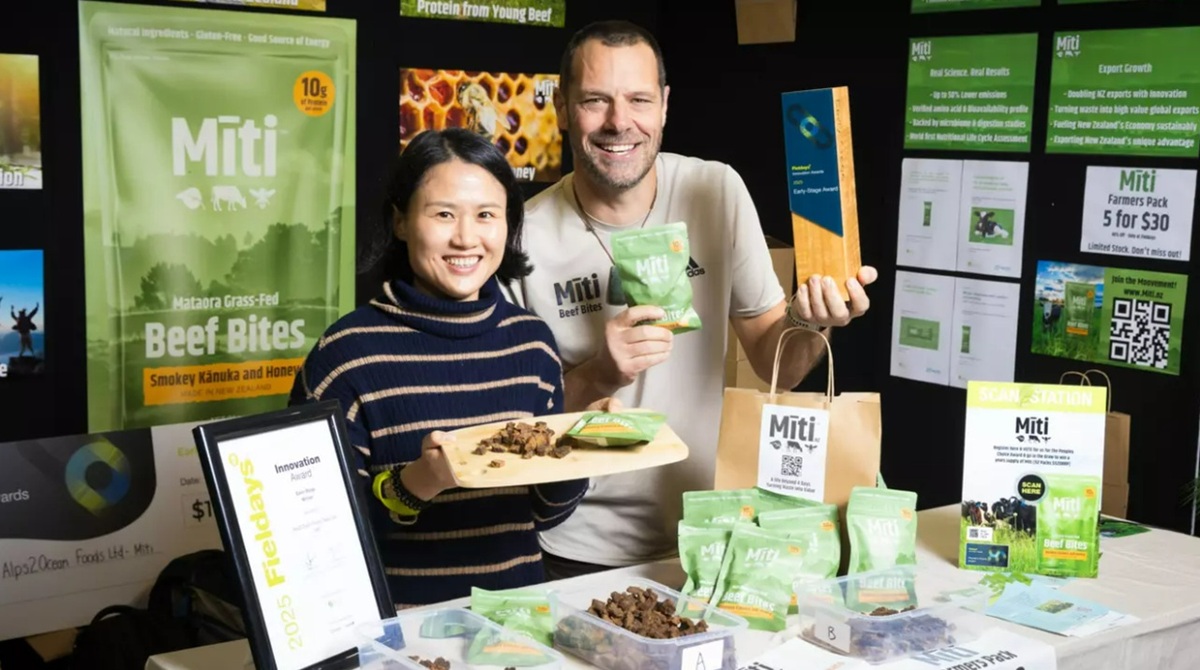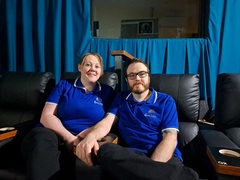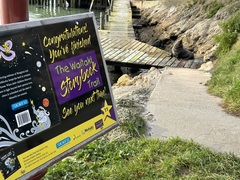Beefy innovation earns double Fieldays win for Waitaki start-up
Ashley Smyth
19 June 2025, 2:13 AM
 The Mīti team, Dr Lily Liu and Daniel Carson, with their Early Stage Innovation Award at Fieldays last week. Photo: Supplied
The Mīti team, Dr Lily Liu and Daniel Carson, with their Early Stage Innovation Award at Fieldays last week. Photo: SuppliedA Waitaki start-up is gaining national attention following a double win at Mystery Creek Fieldays 2025.
North Otago man Daniel Carson says he was “a bit emotional” when his company’s meat snack Mīti was named both the Early Stage Innovation Award winner and the People’s Choice Award winner last week.
Fieldays is the Southern Hemisphere’s largest agricultural trade show, held in June every year. This year, it attracted 1200 exhibitors and more than 110,000 visitors, organisers say.
Alps2Ocean Foods Tapui Ltd was one of 63 entrants in the Innovation Awards, which Daniel attended with his co-founder and food technologist, Dr Lily Liu.
They were excited when Mīti was named one of the top five finalists, and even more surprised to win, he says.
“It’s an incredible honour, especially knowing how many innovative technology ventures are out here trying to make a difference . . . and on the surface we're a meat snack.”
Daniel is grateful to the award judges who, through interviews and the information in his Fieldays application, saw the science-backed benefits behind Mīti's smokey kānuka and honey beef bites.
The prize is $15,000 cash, and $7,000 worth of product development and delivery services. The People's Choice Award was $2,000.
“It’s the kind of boost that makes you feel like, yeah… we’re on the right track," he says.
“The whole value-chain innovation, the low-carbon science, the opportunity for New Zealand Inc. with a unique sort of stock class, and I suppose this approach of looking at red meat as a functional food and as an ingredient you can incorporate with other functional ingredients to produce some pretty special things.”
Head judge Shane Dooley says Mīti provides a game-changing solution, transforming bobby calf waste from the dairy industry into a high-value, low-carbon protein product.
“By addressing a long-standing social license challenge, they're helping reshape the wellbeing narrative around calf management in New Zealand.”
Mīti creates value from waste, reduces emissions, and offers a commercially viable path forward for a more circular and ethical agri-food sector, he says.
Daniel says Mīti was never just about trying to insert New Zealand as a player in the multi-billion dollar world of meat snacks - it was about “fixing a broken bit of the system” and giving bobby calves a life beyond four days old.
“We figured if we could turn that into something good that people actually want to eat, that farmers are proud of, and that holds up in export markets, then we were onto something.”
Daniel came up with the concept of Mīti almost four years ago, as a potential solution for the non-replacement calf issue in the dairy industry, where most bull calves are killed almost straight away.
His theory was that if the calves are raised on grass over the spring and summer months, they do not require surplus feed, and the “feed conversion efficiency” means they are easier on the environment.
The results of an AgReseach study Daniel commissioned were released late last year confirming this, and proving dairy-derived beef raised to 10-18 months has a carbon footprint up to 48% lower than the average for mixed beef cattle in New Zealand.
From Mīti’s initial appearance at Fieldays two years ago, with samples in the prototype category, it is now being sold online as a shelf-stable protein snack.
Further research is now going into creating new flavours, the possibility of using different proteins and functional ingredients.
“It’s been a big ride,” Daniel says.
“We’ve had some tough patches, especially financially, but we know it can work - we just have to stick at it.”
Next steps for the company are figuring out how to scale up production in New Zealand without sacrificing values.
The first round of production was partially funded through crowdfunding platform PledgeMe and took place at Auckland’s Food Innovation Network (The Food Bowl).
High costs and unavailability of the necessary equipment mean this will not be a viable option for the next production run.
“We’re going to need to raise capital later this year - mainly so we can keep manufacturing in Aotearoa, which has always been a core part of the vision.”
“It’s about more than just growing a brand. It’s about showing you can take a waste stream and turn it into value here at home - backing the farmers, creating jobs in the regions and keeping the benefits in communities,” Daniel says.
NEWS
WHAT'S ON GUIDE





